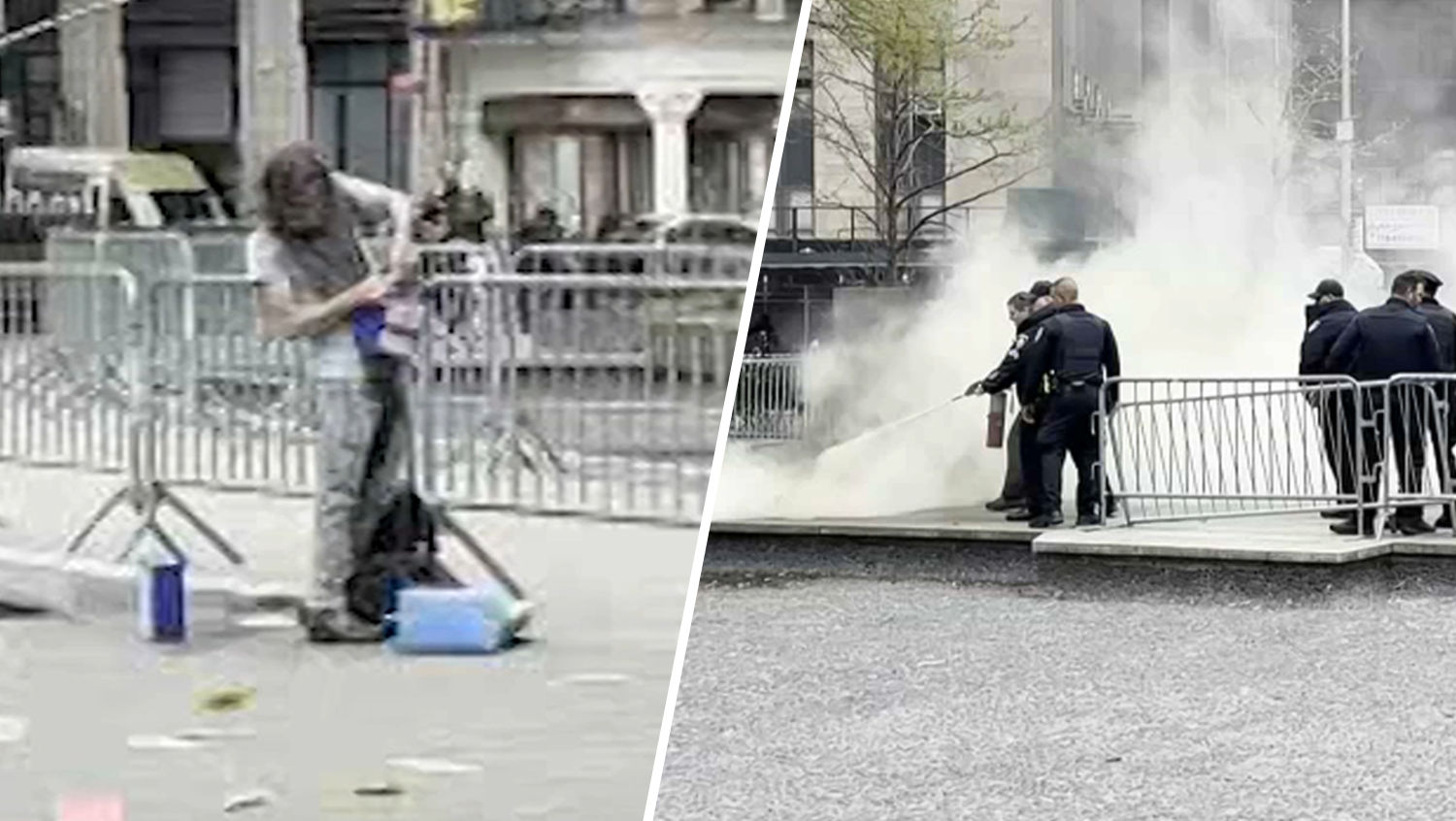What to Know
- New York City officials have agreed on a $88.1 billion proposed budget that includes deep cuts to the police department and other city agencies, Mayor Bill de Blasio announced Tuesday.
- The City Council voted to approve the budget later Tuesday
- According to the mayor, the city cut the budget from its initial $95.3 billion proposal as it struggled to balance funds amid a huge revenue deficit triggered by the coronavirus pandemic.
A week after a “defund NYPD” protest became a full-blown occupation outside City Hall, New York City officials have agreed on a $88.1 billion proposed budget that includes deep cuts to the police department and other city agencies, Mayor Bill de Blasio announced Tuesday, but protesters say it's not enough.
"We have reached an agreement with City Council," de Blasio said. "We have worked around the clock."
The City Council voted to approve the budget later Tuesday. However, there was opposition from both sides to the budget, with some saying the cuts were too much, while others said they did not go far enough.
"This budget is not perfect. It is painful, it is imperfect, and it falls far short of much more that we wanted to accomplish," said Bronx Councilwoman Vanessa Gibson, who vote in favor of the budget. "But given the horrific financial climate, no money from Albany, no money from the federal government, a loss of revenue, the thousands of New Yorkers who have died from COVID-19, we had to make tough decisions."
According to the mayor, the city cut the budget from its initial $95.3 billion proposal as it struggled to balance funds amid a huge revenue deficit triggered by the coronavirus pandemic.
"Nine billion dollars evaporated in the span of just months," de Blasio said. "That's what we had to deal with here and it was a challenge."
News
Due to the billions of dollars that were cut in savings, de Blasio said Tuesday that the city will work with labor unions to find ways to make up for those cuts and avoid layoffs come October.
According to de Blasio, the budget focuses on key values: health, safety, food and shelter.
The budget calls for the expansion of NYC Care to Manhattan and Queens ($37.5 million) in an effort to guarantee healthcare in every borough. The budget will also allocate $113 million for specialized COVID-19 clinic for the hardest hit communities in Bushwick, Jackson Heights and Tremont. Additionally, a $450 million effort is also planned for GetFoodNYC to ensure no New Yorker goes hungry, along with more than $33 million to fight food insecurity.
Schools were largely protected from the massive budget cuts, and nearly $116 million was able to be saved for the summer youth employment program, which the mayor said will ensure programming for more than 100,000 young people. Another $8.6 million went to housing programs.
The $88.1 million budget includes $1 billion in cuts and reduces expenses to the NYPD while maintaining patrol strength and street safety.
The cuts to policing will go to city youth centers ($450 million will go to recreation centers "focused on communities of greatest need," de Blasio said), education and NYC Housing Authority and there could be changes to the department’s role in policing schools, de Blasio previously said.
“The NYPD did a hell a good job in saying, ’Ok, here’s a bunch of things we could do while still keeping this city safe,” he said. “We need to redistribute revenue to communities that need it the most. We know our young people are hurting.”
Also among the programs cut is the city's Fair Fares program, which was designed to help make mass transit more affordable to those less financially secure.
“The Mayor's decision to slash the Fair Fares program will make it more difficult for tens of thousands of customers who rely on mass transit to afford to get to jobs, school and work as New York continues to reopen," said NYC Transit Interim President Sarah Feinberg. "At a time when the MTA is hemorrhaging money at record levels due to the COVID-19 crisis, this cut sets us back and will further hurt our ability to provide critical services to New Yorkers."
The budget also calls for spending reduction by canceling the July class of the NYPD, reducing overtime as well as reducing contracts and non-personnel expenses. Additionally, as part of the overall NYPD reform, certain responsibilities that typically were assigned to the NYPD will now be transferred out by way of crossing guards and the Homeless Engagement Unit.
The budget talks came as hundreds of demonstrators have spent the past week camped out in City Hall Park and demanding police defunding following weeks of protests over the death of George Floyd and other Black Americans killed by law enforcement.
Organizers have called it “Occupy City Hall” — a nod to the 2011 Occupy Wall Street movement a few blocks away in Zuccotti Park. They were still there Wednesday morning, hours after the budget cut to the NYPD has been approved, because they say the budget did not include an NYPD hiring freeze or a commitment to true school safety reform.
“It’s pathetic that some Councilmembers continue to falsely claim they cut $1B from the NYPD budget, even though Council Speaker Johnson clearly conceded that this wasn’t true, Comptroller Stringer slammed the funny math as a 'bait and switch,'" said Anthonine Pierre, spokesperson for Communities United for Police Reform and Deputy Director of Brooklyn Movement Center.
New York City Public Advocate Jumaane D. Williams announced that he plans to prevent the execution of the budget during the final tax warrant process.
There were some tense moments through Tuesday, when officers told protesters to get out of the street and tried pushing them back to the park when some refused. Two people were arrested, and others at the protest said they got bumps and bruises in the scuffle.
The group directed its demands — scrawled on colorful placards, a canvass of graffiti and a massive poster taped over a subway entrance — at de Blasio and Council Speaker Corey Johnson.
“We’ve done different levels of escalation to make sure we’re getting their attention,” said Jonathan Lykes, one of the movement’s organizers. “If they defund the police by $1 billion then we have won — but that’s only our demand this week.”
The occupation has drawn protesters barely old enough to vote but also veteran activists like Debbie Williams, of Brooklyn, who described the movement as unlike any she’s seen.
“People’s eyes are opened now,” said Williams, who slept at the site Sunday and was cooling off Monday in a furnished area dubbed the “Chill Zone.”
“We’re seeing change,” she added, “but it’s not enough.”
The idea of slashing the NYPD's budget, now around $6 billion annually for operations plus several billion dollars more in shared city expenses, like pensions, seemed politically laughable even a year ago. Memories of the Sept. 11 attacks and the high-crime decades of the 1970s, 1980s and early 1990s were too fresh.
But now, city agencies across the board are dealing with the big cuts due to a huge loss in revenue caused by coronavirus shutdowns. The NYPD has about 36,000 officers. Asked if that number will hold, de Blasio responded: “Whatever we do in terms of headcount has to keep the city safe.”
There were also 1,163 cadets set to become members of the NYPD in July. Now, they will not be joining the department.
Patrick Lynch, head of the Police Benevolent Association union, said that any cuts will lead to fewer cops on the streets amid a spike in shootings that has lasted several weeks.
“We will say it again: the Mayor and the City Council have surrendered the city to lawlessness. Things won’t improve until New Yorkers hold them responsible,” Lynch said in written statement.
The City Hall Park occupation was organized by Black and LGBT activists but sought to include input across the ideological spectrum. A makeshift “People's Library,” assembled under a tent, promotes “radical literature.”
A nearby “bodega” featured free donated food and personal protective equipment to occupiers, many of whom are wearing masks. Speakers announced “de-arrest training” sessions and reinforced the expectation that residents of the space look after one another.
“We want racial injustice to end, and the means is that we stay here right now in this space,” said Manny, who addressed the crowd but declined to give his last name. “It’s very clear that people want to stay past Tuesday and that people want to see police and prison abolition.”
Gatherings of more than 10 people are still banned in New York City because of the coronavirus, but those rules have been ignored by protesters for weeks and police have not moved to enforce them.
Lykes said the occupation has made the NYPD “nervous,” recalling a string of minor confrontations that were resolved without arrests. He differentiated the peaceful assembly in Lower Manhattan from a weeks-old occupation in Seattle that has seen episodes of violence.
“We have an uprising and one of the largest we’ve seen since the death of Martin Luther King,” he said. “These are the worst of times but the best of times as far as an opportunity to change.”



